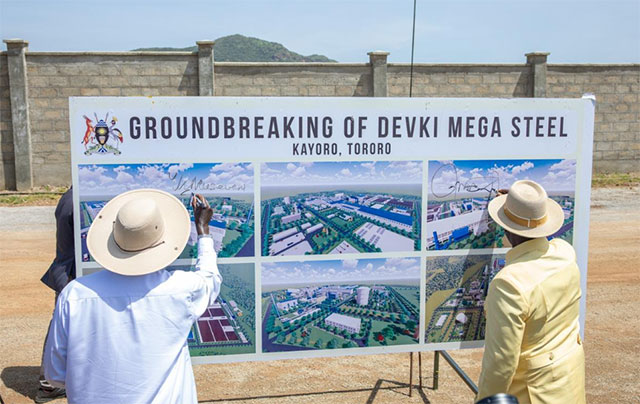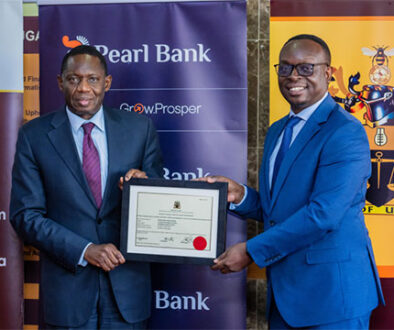Devki Group stakes $500m on Uganda steel

By Our reporter
TORORO – Uganda’s President, Yoweri Museveni and his Kenyan counterpart, William Ruto, broke ground Sunday on a $500m steel manufacturing complex in Tororo, eastern Uganda, in one of East Africa’s most ambitious attempts to reduce dependence on imported metals and capture greater value from the region’s mineral wealth.
The investment comes as East African governments seek to move beyond commodity exports towards value-added manufacturing, addressing chronic trade deficits driven by imports of finished goods. Museveni said Uganda loses an estimated $5bn annually on products that could be manufactured domestically, including steel.
“For over 500 years, Africa has been losing value through the slave trade, colonial systems, and modern economic practices that extract raw materials without adding value,” Museveni said at the ceremony in Kayoro Village, Tororo district. “Today we are in the process of liberating Africa.”
Import dependent
Uganda’s steel sector remains heavily import-dependent, with domestic production meeting only a fraction of annual demand estimated at over 500,000 metric tons. Existing producers, including Roofings Group, Steel and Tube Industries Uganda, and Tembo Steels focus primarily on rolled steel products and roofing materials rather than primary steel production.
The country imports an estimated 80-90 percent of its steel requirements, primarily from China, India, and Turkey, creating substantial pressure on foreign exchange reserves. The Devki plant’s integrated approach—from iron ore processing to finished steel products—represents a significant expansion in domestic capacity.
Steel demand across Africa is projected to rise from 39.5 million metric tons in 2024 to 52 million tons by 2034, driven by infrastructure development and construction growth, according to industry forecasts cited by Ruto. The Tororo facility aims to serve markets across the eight-nation East African Community bloc.
“We convene here not just to commission a factory but to usher in a new, audacious chapter in Africa’s industrialisation ambitions,” Ruto said, describing the project as critical to strengthening regional value chains.
Raval, known locally as “Guru,” pledged that 90 percent of factory positions would go to residents of Tororo and surrounding communities. The industrialist has invested in steel operations across the region and plans a separate iron ore refinery in Uganda’s Kabale district that would create 16,000 additional jobs, Museveni said.
The project will leverage Uganda’s iron ore deposits, estimated at over 350 million metric tons of proven reserves in Kabale, Kisoro and Tororo districts, though most remain unexploited due to limited processing infrastructure and high production costs relative to imported alternatives.
Local communities cautioned
Museveni cautioned local communities against land compensation disputes that could deter investment, pledging government intervention to resolve payment issues.
“The man is going to invest $500m here, so please don’t bother him about money for compensation,” he told residents. “The government will handle that.”

The investment underscores deepening economic cooperation between Kenya and Uganda as both countries pursue industrialisation strategies. Ruto announced Kenya would in January advance the next phase of its Standard Gauge Railway from Mombasa through Naivasha to Malaba, eventually extending to Tororo to reduce freight costs for manufacturers.
Museveni described Uganda’s reliance on road-based cargo transport as “irrational” and welcomed the railway expansion as essential infrastructure for large-scale industry.
“Importing steel is importing poverty,” Raval said. “We must produce here, create jobs here, and empower the youth.”
Industry analysts note that success will depend on the plant’s ability to compete with established Asian suppliers on price and quality, as well as navigating infrastructure constraints including unreliable electricity supply and high energy costs that have hampered previous industrial ventures in the region.
Ruth Nankabirwa, Uganda’s energy minister, called the groundbreaking a “landmark event” in the country’s industrialisation drive, while first deputy prime minister Rebecca Kadaga described it as evidence of advancing regional integration.
Raval praised Ruto’s economic reforms, including measures to stabilise Kenya’s economy and control inflation, saying the policies had created favourable conditions for cross-border investment in manufacturing



